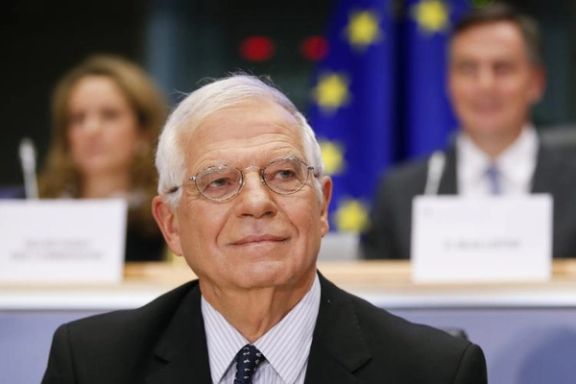EU Top Diplomat Says Iran Obstructing Nuclear Deal Talks With New Demand

The European Union's top diplomat Josep Borrel says talks to revive the 2015 Iran nuclear deal are stuck by Tehran after a hurdle thrown by Russia was overcome.

The European Union's top diplomat Josep Borrel says talks to revive the 2015 Iran nuclear deal are stuck by Tehran after a hurdle thrown by Russia was overcome.
"It’d be a shame not to reach some sort of an agreement when we're so near to reaching one,” Borrel told the European Parliament on Monday after returning from his tour in Persian Gulf Arab states.
“But I cannot guarantee that we will reach an agreement", he added.
"It seems that two weeks ago, we almost had it. Then Russia came, Russia was obstructing" because Moscow was looking for leverage over the West in its ongoing war in Ukraine, Borrell told EU lawmakers in Brussels.
According to the EU top diplomat, Russia wanted to prevent sanctions on Iranian oil being lifted "because if Iran started producing oil there’ll be more supply in markets and that's not in the interest of Russia".
The landmark agreement that Tehran signed with the United States, Britain, France, Germany, Russia, and China in 2015 allowed for the easing of sanctions against Iran in return for curbs on the country’s nuclear program.
But then-President Donald Trump unilaterally pulled the United States out of the deal in 2018, and started reimposing crippling economic sanctions against Iran, while Tehran began rolling back on most of its commitments under the accord.
Over the past months, negotiations have taken place in Vienna to bring back the pact, with Borrell's deputy Enrique Mora coordinating the talks.
The volatile oil markets have been closely watching progress of the Vienna talks as the lifting of restrictions on Iranian crude export could help counterbalance disruptions caused by the Russian invasion of Ukraine.
But now that Moscow has lifted its objection, other demands have been raised that aren’t part of the nuclear deal, such as the status of Iran's Islamic Revolutionary Guards Corps (IRGC), Borrell said.
Tehran has demanded that the United States remove the IRGC from its list of Foreign Terrorist Organizations (FTOs).
Borrell's downbeat assessment of the talks in the Austrian capital comes three days after he announced that the parties involved could reach an agreement to restore the nuclear deal in "a matter of days".
On March 11, the EU official said the final text of an agreement was "essentially ready and on the table."
Speaking on March 5, Russian Foreign Minister Sergei Lavrov said that sanctions imposed on Moscow had created "problems from the point of view of Russia's interests" regarding the restoration of the Iran nuclear accord, formally known as the Joint Comprehensive Plan of Action (JCPOA).
Such sanctions could complicate Moscow's involvement in Tehran's civilian nuclear program and trade with Iran, including arms sales, said Lavrov, who demanded "written guarantees" from the United States.
But Moscow apparently backed off later when Washington and its European allies refused to budge and limited Russian demands to JCPOA-related cooperation, something that has apparently been guaranteed in the text of the agreement being negotiated.
Russia is widely expected to play a central role in implementing a restored JCPOA, especially in removing Iran's stocks of enriched uranium exceeding limits set by the deal, a task it undertook when the agreement was reached in 2015.
The Biden administration has apparently agreed with a Russian demand that would involve lucrative deals for Moscow to expand Tehran’s civilian nuclear program, including the construction of two additional nuclear reactors at the Bushehr power plant.
Borrell said on Monday that his team were "shuttling between Tehran, Vienna, Washington trying to find a solution."
Mora travelled to Tehran over the weekend and met with Iran’s top negotiator Ali Bagheri-Kani and Foreign Minister Hossein Amir-Abdollahian in a bid to close the “remaining gaps”.
Iranian officials insist that Tehran is willing to conclude the talks and sign "a good, strong, and lasting agreement" if the US is "realistic" and makes "a political decision".
Last week, a spokesman for the US State Department a possible deal with Iran could be close, while also warning it was "neither imminent nor is it certain".
Bipartisan opposition has been growing in Washington against the Vienna talks and the prospect of removing the IRGC from the U.S. terrorism list.